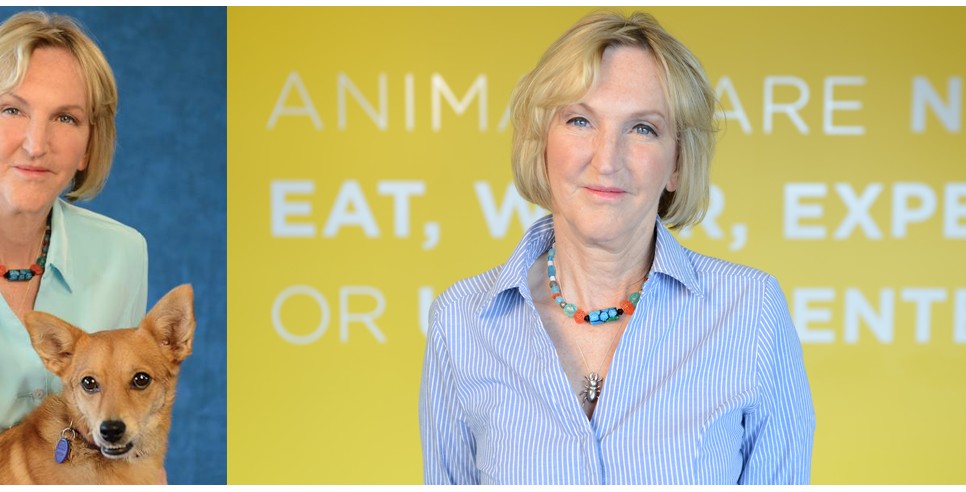
Ingrid Newkirk grew up in India, where she recalls seeing animals dying on the streets in cities like Calcutta and Mumbai. For more than a quarter century as the co-founder and president, she has led People for the Ethical Treatment of Animals, universally known by its acronym, PETA, has advocated – no, proselytized for total abstinence from anything that hurts or diminishes animals, beginning with eating or wearing them.
Starting as a group of fewer than half a dozen friends, PETA is now more than 3 million members strong, making it the world’s largest animal rights organization. And it is the most controversial, not only because of the overtly absolutist approach taken by PETA, and voiced clearly by its leader, but also for their guerrilla theater tactics, whether tossing fake blood on real furs at fashion shows or picketing the Oscar Meyer Weinermobile.
Ingrid’s earliest influences came as a British child living in India, but things really began in her 20s, when she was living on a farm in the US.
“A neighbor moved away and left all these cats behind, who started to wander into our garden – our yard, and to have their kittens in my van,” Ingrid said. She rounded them up and took them to the Humane Society shelter, which she assumed would be, well – humane. “I was scandalized,” she said. “I found the shelter was a terrible dump. It was filthy and the animals were afraid.”
That changed the trajectory of her life. Ingrid had been studying to become a stockbroker. Now, instead of pursuing a career on Wall St., she took a job at the shelter, caring for the dogs and cats in the way she thought they deserved. Eventually she became an Animal Cruelty Officer. But, she said, she had not become a vegan, and still ate animals and still wore them.
“It wasn’t until I had gone out on a farm call where animals had been abandoned, and found a little pig and saw what he had gone through,” Ingrid remembered. “Then I thought about what I was having for dinner that night, and realized it was pork chops –I made the connection between what I was eating and cruelty to animals.” Even then, Ingrid said, she did not make the change all at once, but gradually, the mounting evidence of human mistreatment of animals and the reality of their suffering weighed on her conscience. She stopped wearing furs.
“Then I read ‘Animal Liberation’ by Peter Singer. He said that maybe it’s not just treating them kindly; maybe it’s recognizing that you’re just one animal among many with different cultures, different languages, different interests, but the same ability to feel. “And I thought; that actually makes sense to me.”
She formed a group with four friends to publicize what they had learned about how animals were being maltreated, including what Ingrid had seen of laboratories in her role as an ACO, and PETA was born.
Ingrid is pleased by the amount of progress she and the millions of others standing behind her have been able to accomplish in the last 25 years.
“Looking back, you see the fruit of your labor,” she said. “You see enormous change –everything has changed. Medical school education has changed. You can go to Harvard and you need not force feed or cut open animals to be trained. You use computer simulators that are programmed with data from human beings.” Thousands of companies now no longer test cosmetics and soaps on animals and produce all vegetable products. And PETA has demonstrated that people demanding changes can be heard if they own the choices they are making in the marketplace.
“With holidays coming up,” she said, “I would say anyone who cares about animals can buy something for gifts that aren’t made from animals and haven’t been tested on animals. … If you look at it, and there’s a bit of an animal in it, consider that the animal might not have given it up voluntarily.”
Still, she knows that she has taken on a Sisyphean task. “Our job is like working for world peace. It’s never going to happen as long as human nature [exists]– people are not very nice to each other all over the world. So,” she said, “getting them all to be nice to animals all the time is a tough mountain to climb. But, you can make significant changes, and we have. So, looking ahead, you just move as fast as you can and educate as many people as you are able to.”
Photo of Ingrid Newkirk Courtesy of PETA









